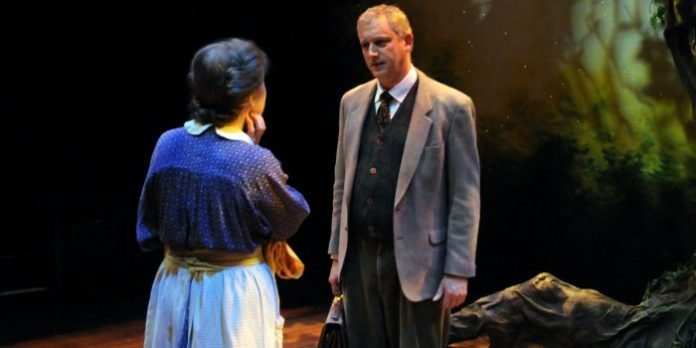Entering the intimate, underground confines of Pacific Theatre for Tolkien, there is an immediate and palpable magic in the air. At centre stage, set designer Drew Facey has stamped an elegant, ornate compass rose onto rich wooden floorboards. Hanging down over the space are leafy branches, leading back to thickly root trees that seem to grow out of the wells.
It is a perfect setting to explore the odd and intricate friendship of J.R.R. Tolkien and C.S. Lewis – respective authors of The Lord of the Rings and The Chronicles of Narnia.
Playwright and director Ron Reed – who also stepped into the title role on opening night, due to a medical issue – centres his play around ‘The Inklings’, an Oxford University literary circle that produced some of the most iconic and influential works within the fantasy genre.
In Reed’s play however, we have only fleeting glimpses of these magical realms. Instead, the work is very much rooted in this world: following Tolkien’s fussy fixation with building the history & lineage of his world; Lewis’ blossoming spirituality; and most specifically the dynamic, often tumultuous, relationship between the two.
The narrative begins during the interwar period – when Hobbits were not even a twinkle in Tolkien’s eye – and follows through to Lewis’ death in 1963. Reed’s portrait of the relationship is an extraordinarily intimate one, clearly benefiting from an enormous amount of research. The two central figures are not subject to simplification or characterization, but painted in a wonderfully complex light. Ian Farthing is especially compelling in the role of C.S. Lewis, bringing generous emotional warmth, balanced by a keen and clear intellect.
The play avoids one of the most common temptations present in biographical works: to artificially apply a single overarching theme or central struggle to a human life that conveniently resolves at the climax. Instead, Reed seems to follow the real-life friendship dynamic of the duo as it is influenced by external factors such as war, publishing success, and jealousy around new Inkling members.
It is in jealousy that we see the most nuanced and intricate articulation of Tolkien and Lewis’ relationship. First, when Lewis becomes close with journalist-turned-author Charles Williams, played with an affable, disarming gusto by Anthony F. Ingram, and later when Tolkien becomes chummy with the swaggering poet Roy Campbell, an understated Simon Webb, who pulls double duty as a playfully irreverent Hugo Dyson.
In both instances, we are presented with men who may have superior command of the English language, but struggle when it comes to basic communication with one another. Like their friendship, the jealously is multi-faceted, as it integrates hurt feelings, bruised egos, religious conviction, and deep-rooted insecurity. The interactions between the two men, as they hold back from speaking their true minds, are some of the most engaging in the work.
The adherence to history and decision to eschew a unifying story arc does have the effect of making the work feel long. Playing out over three acts, Tolkien primarily lives in the realm of ideas; more than a linear narrative, it offers insight into the minds and souls of two great titans of literature. More than telling a story, it offers an experience akin to sitting one table over at The Eagle and Child pub, catching snippets of Tolkien’s mutterings about Hobbits, while Lewis responds with half remembered dreams of a single lamppost in a snowy forest.
Tolkien, written and directed by Ron Reed. A Pacific Theatre production on stage at Pacific Theatre (1440 West 12th Ave, Vancouver) until June 9. Visit pacifictheatre.org for tickets and information.

